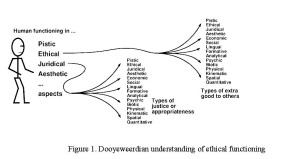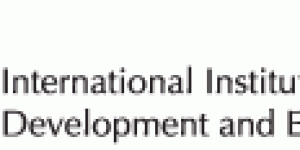IIDE Proceedings 2011 ~ Vol. 2 ~ Investigating The Effects Of IS Development Ethical Issues On Information System Units From Dooyeweerd’s Suite Of Aspects Perspectives
No comments yet Abstract
Abstract
Discussion of the likely effects of ethical issues of Information System Development (IS Development – ISD) on information system units is sparse and does not present a coherent picture. In this regard, throughout this theoretical study, it is tried to apply Dooyeweerd’s suite of aspects to ethical issues of ISD in order to explore and analyse their consequences of functioning regarding good and bad of applicable aspects. Conducting this analysis is describing that ethical functioning will result in diverse types of good which are distinguishable by referencing each to specific Dooyeweerd’s aspects. This functioning also implicates a given situation in which sacrifices such as effort, pleasure or etc is involved as thus extra good will be created. In this context, the distinction between the conception of bringing (extra) good by ethical functioning and merely preventing bad by juridical functioning is clarified throughout applying Dooyeweerdian aspectual analysis.
Keywords:
Ethical Issues, Ethical Functioning, Dooyeweerd’s Aspects, IS Development (ISD), Extra Good
1. Introduction
Ethical principles have been always assumed as part of everyday life and problems and issues emerged by ignoring them have been also discussed by different scholars (Stahl, 2007, 2008). Ethical issues can be studied in relation to professional life as well (Gotterbarn, 1992, Stahl, 2008). This includes ethical principles in information system (e.g. McDonald, 2007) and the information system development areas (Rogerson, et al, 2000; Cohen and Cornwell, 1989; Wu, et al., 2001; Warren, 2006). Gotterbarn (1992) debated that professionals must be aware of ethical issues in their profession in order to restrict the possibility of their occurrence. Charlesworth and Swery (2002) argued that IS professionals should be aware of ethical issues that both generally and specifically can affect their works, organizations and related stakeholders.
However, as studies show and also explicitly highlighted by some scholars (e.g. studying difference between ethical and legal issues by Pollack and Hartzel, 2006), discussions of consequences of ethical issues suffers from blending with other subject areas such as moral issues, legal issues, social issues and etc. Besides, different studies in this field (e.g. McDonald, 2007) and ethical issues frameworks that formulated by disparate institutes (e.g. ACM Code of Ethics) demonstrate the importance of discussing consequences of ethical issues in ISD.
However, the treatment of ethical issues lacks an overall coherence, and there is still need to discuss the effects of ignoring and breaking ethical issues in ISD. Understanding those consequences can help IS developers and information system units be aware of possible problems they might face in information system projects. To discover those consequences, an understanding of ethical functioning that embraces the wide diversity of issues and their consequences is required. For this aim, we have first studied and employed several existed ethical issues frameworks outlined by scholars or (related) institutes. And in the second step, those ethical issues are analyzed by the means of Dooyeweerd’s suite of aspects which consists of fifteen irreducible yet related aspects. The meanings of aspects can indicate the main properties and behaviours of ethical issues and the laws of aspects can address their way of functioning and highlight good and bad consequences.
It is worthy to point out that ethical issues are not limited to selected ethical issues discussed in this study. That is, the aim of this paper is not extending or modifying ethical issues but authors intend to highlight the consequences of breaking or ignoring ethical issues by selecting some of existed ones.
We expect that this brief theoretical study, can highlight the role of ethical issues in ISD and draw involved IS developers’ attention to include ethical issues in Information System (IS) projects in adjustment with other important factors.
2. Ethical Issues of ISD
2.1 Review of ethical issues
Following Mason’s (1986) debate about ethical issues of information era – PAPA: Privacy, Accuracy, Property, and Accessibility – many researchers constructed their studies based on this structure either explicitly (e.g. Pollack and Hartzel, 2006) or implicitly (e.g. Rogerson et al., 2000). Over the years more studies have proposed new dimensions to PAPA (Thomson and Schmoldt, 2001). Other frameworks were developed, such as one based on obligations (Johnson, 1985 stated by Oz, 1992) and some institutes such as Association for Computing Machinery (ACM), the British Computer Society (BCS), and The Australian Computer Society (ACS) (Thomson and Schmoldt, 2001). Table 1 summarises some of these.
| Framework | Source | |
| PAPA | Privacy, Accuracy, Property, Accessibility | Mason, 1986 |
| Extended PAPA | PAPA+ Quality of Life, and the Use of Knowledge in Organizations | Forester and Morrison, 1994 and Bella, 1992 |
| Obligations | Obligations to society, employer, clients, and colleagues and professional and organizations | Johnson, 1985 |
| ACM Code of Ethics | Contribute to society and human well-being, … | http://www.acm.org/about/code-of-ethics |
| BCS Code of Conduct | The Public Interest, Authority, … |
http://www.bcs.org/server.php?show=nav.6030 |
| ACS Code of Ethics | Priorities, Honesty, … | http://www.acs.org.au/index.cfm?action=show&conID=coe |
Table 1. Framework of Professional Ethical Issues
Some of these ethical issues are common among all frameworks, some have been stated in different wordings but their descriptions and characteristics are similar, and some are specific to certain frameworks.
In the PAPA framework, the emphases are on protecting dignities of individuals and avoiding of indignities of deprivation of information literacy (Mason, 1986). In an extension, quality of life is focused on job satisfaction, health, safety and emotional concerns, and overall satisfaction. (Forester and Morrison, 1994 stated by Thomson and Schmoldt, 2001)
In the obligations framework, IS professionals through their interactions with society, employers, clients, colleagues, and organization need to be responsible for updating their own knowledge and that of involved stakeholders, applying practical knowledge into their work, and being involved in improvements. Important characteristics include respect, dignity, being objective, being protective and supportive, confidentiality and trust, intelligibility of language, avoiding conflicts of interest, and lawfulness. They should not abuse their own expertise and experience. (Johnson, 1985 stated by Oz, 1992)
The BCS professional code of conduct and ACM code of ethics have quite similar focuses in which the professional must be aware of public health, safety and environment, legitimate rights of third parties (colleagues, organization, employer, public, and even competitors). Important characteristics include: lawfulness, dignity and respect, violations because of discrimination on inappropriate grounds (race, colour, ethnic origin, gender, sexual orientation, age and disability), resource accessibility, avoiding conflicts of interest, being supportive, and involvement in improvements, harmony and integrity with others, updating and using related knowledge, evaluation and self-assessment. There must be no abusing of lack of knowledge and experience in others.
The ACS Code of Ethics has also investigated a variety of ethical issues for IS professionals in relation to clients, employers, and colleagues. IS professionals are responsible for priorities they might set for others’ interests and needs in relation to their own, providing enough information to stakeholders for involving them, awareness of stakeholders’ needs and interests, honesty in justification and evaluation of stakeholders, presenting and using real knowledge and skill they have, social implications which protect health, feelings and safety of work, privacy, avoiding unfair treatment of others, ensuring overall satisfaction and quality of life, professional development and updating knowledge and skill of involved stakeholders and of themselves. They should look into the way professionals are interacting with each other and their clients to respect ideas, avoid abuse of others’ works and reputation, and avoid direct or indirect dishonesty and fraud by cooperating with hustlers.
2.2 Consequences of ethical issues
Central to the above discussions of ISD ethics are norms of which ISD professionals should be aware and be guided by (Mason 1986; Forester and Morrison, 1994; Bella, 1992; BCS; ACM; ACS ), responsibilities they should take on (Johnson, 1985; BCS; ACS; ACM) and behaviour of professionals (BCS; ACS; ACM). But there has been little discussion of consequences of breaking (or indeed upholding) ethical principles.
There have been various theoretical (e.g. Thomson and Schmoldt, 2001; Chapman, 2006) and practical (e.g. Wood-Harper, et al., 1996; Rogerson, et al., 2000; Davison and Loch, 2002; McDonald, 2007) studies during last decades on how and whether ethical issues can affect information system development process. From most of these investigations we can conclude that regardless of the structure information system units take for their profession, the application of ethical principles is a must for them. Gotterbarn (2002) argued that information system developers need to enlarge the risk analysis boundary to include ethical issues as part of their risk assessment, because his cases showed that ignoring ethical issues (besides social and political issues) resulted in impractical software applications and the need for IS developers to continually modify their products, which problems can drive organizations out of business. In older studies like Oz (1992) and Wood-Harper et al. (1996), there have been debates that ethical considerations can uphold information system units and professions in terms of good reputation and respect.
However, in most of these studies (including those in section 2.1), there has not been adequate debate about the consequences of ethical issues. First, discussion of consequences has tended to be divorced from discussion of norms, behaviour and responsibility, with the attendant danger of sliding into a purely utilitarian view of ethics. Second, limited types of consequences have been discussed, and there is no clear means of widening the diversity of issues. For example, in the current volume, Krishnan Harihara & Basden (2011), along with their (2010, 2009), show how idolatry of technology can harm e-government projects, bringing harmful effects on society when it is implemented. The idolatry is by politicians, senior managers but also by IS developers, so the issue is relevant to ISD; should this be brought into the debate on ethics of ISD and, if so, how? Third, there seems to be two discourses in ISD ethics, one about evils to be prevented (e.g. Gotterbarn, 2002), the other about good that ethical behaviour can bring (e.g. Wood-Harper et al. 1995), with no clear link between them. Related to this, ethical issues are confused with moral (Stahl, 2007) or legal (Pollack and Hartzel, 2006) or social (Laudon & Laudon 2009) issues.
This paper offers an approach that might address these shortcomings. It is based on the philosophy of Dooyeweerd (1955) and carries out a systematic study in an attempt to demonstrate how all these issues may be set within a coherent framework that provides a basis for considering consequences of ethical issues in ISD.
3. Introducing Dooyeweerd’s aspects
The Dutch philosopher (1894-1977) Herman Dooyeweerd delineated fifteen different aspects, which can be understood as “spheres of meaning” and “spheres of law”. In the former one, the emphasis is on how things can be meaningful and this meaning is expressed in the existence, properties and rationality of things and in the latter one, the focus is on goodness, badness and functionality of things. Table 2 shows Dooyeweerd’s aspects, what we understand of their meaning and some typical examples of good and bad functioning and repercussions. For more on Dooyeweerd’s aspects, see chapter III of Basden (2008).
| Aspect | (Meaning) | Example Functioning (Good / bad) |
Example Repercussions (Benefit / Detriment) |
|
| MATHEMATICAL ASPECTS | ||||
| Quantitative aspect | (Discrete amount) | Being-amount | Numeric order | |
| Spatial aspect | (Continuous extension) | Spreading | Simultaneity | |
| Kinematic aspect | (Flowing movement) | Moving | Dynamism | |
| PRE-HUMAN ASPECTS | ||||
| Physical aspect | (Fields, Energy, mass) | Causality | Persistence | |
| Biotic/organic aspect | (Life, organism) | Life functions | Health, Growth | |
| Sensitive/psychic | (Sensing, feeling, emotion) | Sensitivity | Interaction with world | |
| HUMAN ASPECTS | ||||
| Analytical aspect | (Distinction, concepts, Abstraction, logic) | Distinction / Blurring | Confusion / Clarity | |
| Formative aspect | (Deliberate shaping, Technology, skill, history) | Planning, constructing / Laziness | Achievement, Structure / Failure, Mess | |
| Lingual aspect | (Symbolic signification) | Truth-saying / Deceit | Understanding / Misunderstanding | |
| SOCIAL ASPECTS | ||||
| Social aspect | (Relationships, roles) | Respect, Friendship / Hostility | Organisations / Enmity | |
| Economic aspect | (Frugality, resources; Management) | Frugality / Profligacy | Prosperity / destitution | |
| Aesthetic aspect | (Harmony, delight) | Orchestration / Frenzy | Beauty, Fun, Interest / Grotesqueness, Boredom | |
| SOCIETAL ASPECTS | ||||
| Juridical aspect | (‘Due’, appropriateness; Rights, responsibilities) |
Responsibility, appropriateness / Oppression, inappropriateness | Justice / Injustice | |
| Ethical aspect | (Attitude, Self-giving love) | Generosity, humility / Selfishness, Greed | Goodwill / Defensiveness, More greed | |
| Pistic/Faith aspect | (Faith, commitment, belief; Vision of who we are) |
Belief, Loyalty / Disloyalty, Idolatry | Trust, Dignity / Distrust, Decline | |
Table 2. Dooyeweerd’s Aspects: Meaning, Good and Bad
It is important to notice the difference between Dooyeweerd’s technical concept of ‘ethical’ and the concept of ‘ethical’ as loosely discussed in the ISD literature. Dooyeweerd’s concept is to do with attitude, of self-giving versus self-interest, while ‘ethical’ in ISD academic discourse covers both this and also what Dooyeweerd calls juridical, namely ensuring rights and appropriateness; these are discussed below.
There are several reasons why Dooyeweerd’s approach might enrich the discourse on ethics in ISD. Much of today’s thinking on ethics has roots in such thinkers as Aristotle or Kant. Dooyeweerd claimed they had not been critical enough and he went deeper in attempting to understand the nature of the world and of human beings and activity in the world. He began from a very different root, that of Creation, Fall, Redemption (CFR) rather than the dualistic roots of Greek philosophy (Form v. Matter), Scholastic philosophy (Nature v. Grace) or Humanist philosophy (Nature v. Freedom), which always have, he argued, led to problems in understanding and discussing ethics. (He called these roots ‘religious’, but with a very specific meaning that should not be confused with creeds and religious systems.)
Starting from the CFR root led him to see created reality as having two sides, not only all that exists and occurs as concrete, ongoing actuality (what he called subject side or fact side) but also a law side (laws that pertain and enable all existence and occurrence). The law side is composed of ‘laws’ of the aspects. These however are not to be confused with social norms, nor with authoritarian demand or determinative causality, but take the form of promise; for example, a law-promise of the lingual aspect might be expressed as “If we abide by the syntax of the language we are using we will be better understood”. In this way functioning always has consequences, these cannot be separated from each other, and both are inherently connected with norms (the good and bad defined by each aspect). Professional behaviour in ISD is seen as multi-aspectual human functioning (functioning in every aspect simultaneously and in a coherence that is located the human subject), so this can never (and so should never) be divorced from norms and consequences. Each aspect yields irreducibly distinct norms, types of functioning and types of consequence.
His approach to ethics may be founded in the idea that functioning in line with the laws of all aspects is, and leads to, good, while dysfunction in any aspect is, and leads to, bad. Because of being rooted in CFR, he held that no aspect contradicts another in this sense, so it is possible in principle to fulfil the norms of (and be, and bring, good in) every aspect. His thought can give a philosophical basis for questioning, for example, the common assumption that being ethical is inimical to economic viability (and vice versa). Not only so but good functioning in one can actually enhance functioning in another aspect; for example ethical functioning in business and society can establish sustained viability and prosperity.
Dooyeweerd’s notion of aspects arises from his notion of law and subject sides; his suite of fifteen aspects arose because of his roots in CFR, which allows for the possibility of a cohering diversity, in contrast to the dualistic presuppositions, which always act as motivation to reduce diversity to one or two basic principles.
In particular this approach enabled him to distinguish the ethical from either the juridical or the pistic, which can bring clarity to discussion of ‘ethics’ in ISD, which tends to conflate them. Refer to Table 2. That the ethical cannot be reduced to the pistic implies that, though one’s beliefs (credal or ideological or presupposed) might have some impact on what one holds to be right and wrong, ultimately the ethicality of self-giving and attitude cannot be absolutely determined by such beliefs; nor vice versa.
Distinguishing ethical from juridical aspect is particularly important for discussion of ISD ‘ethics’. The juridical aspect is concerned with appropriateness and with human responsibility for maintaining what is appropriate. In particular, in the context of human functioning (such as in ISD), we are responsible for helping to ensure retribution, i.e. rewarding ‘good’ and punishing ‘bad’ either by individual action or by setting up social effective structures such as social norms or formal rules and regulations. All this achieves, however, is to prevent bad occurring. The ethical aspect, by contrast, introduces ‘extra’ good into temporal reality that cannot be explained by the ongoing operation of juridical consequence. As shown on left-hand side of Figure 1, functioning in the ethical aspect involves taking pains (even making sacrifices) to bring good to others that would not otherwise occur. Sacrifice might be of time, money, effort, convenience, pleasure, rights or anything else, and in this way ‘extra’ good-for-others enters the public sphere.
Both juridical due and ethical extra good-for-others are of diverse kinds, which may be understood in terms of target aspects. Figure 1a shows this. This provides a conceptual framework with two benefits. First, the juridical due can be distinguished from ethical extra good, second the diversity of each can be explored systematically. Both juridical due and ethical self-giving are always directed toward some specific kind of normativity, each distinct kind of which is itself distinguished from others by reference to the aspects, as indicated in the middle of Figure 1.
Most discussion of ‘ethics’ in ISD is juridical in nature in that it is concerned with preventing bad and ensuring rights (for example, privacy, accuracy, property, accountability, honesty) rather than bringing about extra good, though a minority of the literature recognises this (such as good reputation (Wood-Harper et al. 1995) and ‘quality of life’). Most discussion of responsibility, obligations, norms, professional behaviour centres on the juridical aspect. Discussion of consequences, however, is more open to the ethical aspect, because ‘consequences’ usually speaks of something positive, a good-for-others that would not otherwise have happened, rather than mere prevention of a negative.
This, then may be a way to integrating the two pools of discourse, without forcing either to be reduced to the other. This delineation of types of good-for-others for which we give of ourselves provides a rich starting-point for discussion of ethical functioning, enabling us to discuss the conditions necessary for each kind of good, the consequences of procuring each kind of good-for-others, and the consequences of not doing so, as in the right-hand side of Figure 1.
To test whether this approach has any potential, the next section considers most of the ‘ethical’ issues discussed in the ISD literature (whether juridical or ethical from a Dooyeweerdian sense) from the point of view of aspects. Since each aspect is reasonably well understood in general terms, we can bring this understanding to bear on discussions of ethical issues. Can an aspect (sometimes more than one) be readily assigned to express the main meaning and normativity of each, and can doing so reveal consequences that can be linked to norms, functioning and responsibility?
4. Analyzing ethical issues using Dooyeweerd’s aspects
In section 3, Dooyeweerd’s aspects were proposed as a way of thinking about ethical issues. Besides, throughout section 2, different frameworks of professional ethical issues were demonstrated in table 1 and until the end of section; each of them was discussed in more detail. Thus, in order to analyze ethical issues, table 1 and its related information from section 2 is employed in this section. Meanwhile, before applying Dooyeweerdian thinking to them, where appropriate, similar ethical issues of different frameworks are combined, for example “applying practical knowledge into their work from” in obligation framework and “using relation knowledge” in BCS professional code of conduct and ACM code of ethics and “presenting and using real knowledge and skill they have” in ACS Code of Ethics are all combined under the name “Applying practical knowledge, skill and experience”. After briefly describing them, we identify in which aspect they are most meaningful as good or bad, discuss the consequences of functioning in that aspect in relation to these issues, based on general understanding of aspectual repercussions such as discussed in Basden (2008). By doing this, a systematic consideration of ethical issues is demonstrated. Followings are arranged based on ordering of Dooyeweerdian grouping of aspects (available in table 2 in section 3 – Mathematical aspects are not discovered in analysis. The reason is provided in Discussion section).
A) Pre-human aspects
– Concerning mental and physical health and safety of individuals, organization and society: Mental and physical health and safety are psychic and biotic issues, and any detriment here makes people less able to work effectively. So IS developers should take pains to consider the wider biotic and psychic consequences of the applications they are developing (such as computer games).
– Quality of life, Overall satisfaction: IS developers by the means of their artefacts should contribute to improve public quality of life, and increase overall satisfaction. Though quality of life and satisfaction can cover most aspects, here we focus on its psychic aspect of emotion, since this affects the individual’s interaction with the world.
– Being protective and supportive for colleagues, employers, and customers: Such support and help is both psychic and pistic in nature in that it is a feeling and also a dignity of the other. Giving more support and help than is due means treating the other as worthwhile and enhances confidence, but failing to give support undermines these pistic qualities.
B) Human aspects
– Being objective: IS developers must understand what they are doing and why, aware of the concepts and logic they encounter during their projects. This is analytical good. Any confusion or opacity about their tasks, the aim of those tasks, the necessary tools and technologies for conducting them, and so on can result in confusion and doubt. A self giving attitude will take pains to enhance such clarity.
– Acquiring and updating knowledge, skill, and experience: Skills and experience are of the formative aspect, and can enhance achievement by those who possess them. So helping others to acquire them brings extra formative good. Not doing so can make individual failures and organizational mess more likely.
– Applying practical knowledge, skill and experience: Application is a formative functioning. IS developers who make use of practical knowledge can improve the quality of their work. Failure to achieve is the result of impractical application of any of those elements.
– Being involved in improvements in organizations and society regarding IS: IS developers should be involved in activities that can change and improve the current situation in organizations and society; activities such as being innovative in developing IS, producing knowledge, sharing knowledge and etc. The main aspect here is formative. A self-giving attitude leads us to expend extra formative effort, and the structure of society becomes more dynamic and ability to respond to the new, but a self-centred or self-protective attitude discourages and hinders effort and ossifies society.
– Educate, inform and provide enough information about IS so that stakeholders and the public are involved: Providing information is lingual functioning, but the main aspect here, which this serves, that of getting others to contribute, is formative. When others feel unable to contribute this saps their morale and less is achieved.
– Intelligibility of language in communication with others like colleague and employers, avoiding direct or indirect dishonesty: This is of the lingual aspect. Honest, intelligible communication enhances many other aspects, such as mutual understanding, better sharing and management and trust, and is thus worth the extra (ethical) effort. Dishonesty and unintelligibility destroy these.
C) Social aspects
– Respecting and protecting ideas, expectations, privacy, and work of others (colleagues, customers, etc.): IS developers need to be aware of others’ needs and ideas. This is the social aspect, in that mere awareness is not enough, since they should respect them as well. The social dysfunction of disrespect destroys friendships and even communities, including that which is the ISD project.
– Justification and evaluation of others: While justification seems juridical and evaluation, analytical, the reason for these is of the social aspect, so that IS developers maintain good relationships with others, stand in appropriate roles, and have appropriate expectations of stakeholders. If this fails, then animosity can result.
– Accurate and proper resource accessibility: IS developers need to access properly and accurately organizational (virtual or real) resources. This concerns resources, so is meaningful in the economic aspect. As Table 2 shows, appropriate access to resources enhances prosperity but inappropriate access can result in destitution which, for IS, can mean failure of project or organisation.
– Avoiding organizational or individual conflict of interest, Awareness of stakeholders’ needs and interests, Priorities they might set for others’ interest and needs and their own interest and ability, Harmony and integrity with colleagues, employers, organization, customers, and society: This concerns various types of harmony, so is of the aesthetic aspect. IS developers might prefer things different and find others problematic but they should not ignore others and should adjust and integrate with their colleagues, customers, employers, organizational rules and aims, and even society needs and expectations. Such harmonization does not mean putting own needs and preferences aside but rather a focus on balance and flexibility. Failure of people to tune themselves with others can bring about unpleasant, disagreeable, and insensitive relationships and interactions, and yet further disharmony in the team.
D) Societal aspects
– Avoiding unfair treats to others: IS developers should avoid unfair treatment of others, whether this is unearned treats or paying too little attention to others. The issue is appropriateness, which is of the juridical aspect. Inappropriateness leads to injustices.
– Avoid discrimination on basis of colour, ethnic origin, etc: Whereas the act of discriminating between people as analytic functioning is good, this issue concerns the basis on which discrimination occurs, that it should never be inappropriate criteria, nor should it results in injustice. So this is of the juridical aspect. A person is a diverse collection of ideas, beliefs, expectations, physical and emotional characteristics, language, understanding level, capabilities, talents and many other factors that make that person unique, and any attempt to reduce them to characteristics like ethnicity is unjust. IS developers should recognise the multi-aspectual nature of human beings, and treat them with due respect on this account. The consequence of this is not only juridical (injustice) but also pistic, in depriving people of dignity.
– Respecting laws and rules, legitimate rights of organizations’ products, services and third parties: Laws and rules are constructed to make organizations and society manageable. As part of society and member of organizations, IS developers should obey laws and rules. This is the juridical aspect, and dysfunction here puts everyone’s rights and due in danger.
– Avoiding abuse of others’ work and reputation, No abuse of own expertise and experience, or lack of knowledge and experience of others: Issues of abuse are of the juridical aspect, whether of one’s own or others’ concerns. Abuse, as a form of oppression, impairs people’s rights of having contribution or dignity and honour.
– Not cooperating with those who perpetrate fraud: IS developers should be loyal to their organization and society: This is a pistic/faith matter. Loyalty enhances trust, confidence and dignity, but disloyalty destroys these. An IS developer can be disloyal for various reasons, including receiving no credit for what they are doing and not being valued. Taking pains to ensure others are valued is ethical functioning that generates pistic good.
– Self-valuation and self-assessment: Evaluating personal abilities and knowledge is a good way for IS developers to understand their weaknesses and faults, but to do this properly requires an attitude of humility, which is a good in the ethical aspect, since it is a self-giving. If they do not criticize themselves with such an attitude, they cannot gain a clear picture of their own weaknesses and strengths, wrongs and rights. Here, the ethical functioning of self-giving leads to an ethical good.
– Confidentiality and trust in others like customers, colleagues: In a trust-based environment, people can work with more confidence and certainty, which is an important pistic good. Lack of trust between IS developers and colleagues, customers, or employers, hinders communication, which itself hinders the entire project.
– Protecting dignities of individuals, organization, and society: Dignity, at any level, is a pistic good. Failing to protect dignity of others leads to dysfunction in many aspects, including antagonism and inconstancy.
All over this analysis, all Dooyeweerd’s aspects from biotic to pistic where applicable are used to clarify consequence(s) of each ethical issue. These are also various kinds of good or bad related to IS use and IS development. Whereas juridical functioning tries to prevent the bad occurring, ethical functioning not only does this but also aims at increasing the positive good. In any given situation, there might be several types of good-for-others that can be enhanced, and any of them will be useful. It is ethical functioning that creates this extra good.
5. Discussion and conclusion
Ethics is part of human life that can guide us in our functioning (Stahl, 2007), including professional life, and especially that of IS developers (Wu, et al., 2001). However, information system units might not clearly include ethical principles in their structures. Studies show that breaking or ignoring them can cause various types of problems in IS projects but understanding of consequences, their diversity and how they link with responsibility, norms and behaviour is in its infancy.
This study has demonstrated that by viewing extant ethical issues through the multi-aspectual lens of Dooyeweerd, possible consequences of each issue may be revealed. This is because, by virtue of Dooyeweerd’s notion of a transcendent law side, human functioning cannot be cannot be divorced from consequences and so discussion of each should always involve the other. Further, both functioning and consequences are intimately tied to norms and responsibility, and with his notion of aspects Dooyeweerd can address all four. So the normative issues of (Mason 1986; Forester and Morrison, 1994; Bella, 1992), the responsibility and obligations of (Johnson, 1985), the professional behaviour of (various codes of conduct) and the consequences of (Thomson and Schmoldt, 2001; Chapman, 2006; Wood-Harper, et al., 1996; Rogerson, et al., 2000; Davison and Loch, 2002; McDonald, 2007) may all be understood and integrated within a single framework.
The study has also demonstrated the capacity of Dooyeweerd’s suite of aspects to cover a wider variety of types of norm, responsibility, behaviour and consequence. Third, preventing evil and bringing extra good are both acknowledged by Dooyeweerd, one understood as juridical, the other as ethical. His aspects provide the basis for both keeping them conceptually distinct (because aspects are irreducibly distinct) and recognising the relationship between them (via his notions of inter-aspect relationships and multi-aspectual human functioning).
This study is only indicative, not exhaustive, so more work is needed to develop discourse about ethics in ISD along these lines. For example, why is it that certain aspects occurred more frequently than others in the above analysis? There might be three reasons. One is that our analysis was biased in favour of those aspects; this is unlikely. Another is that in ISD it is these aspects that are naturally most important. That would be expected of the formative aspect, but possibly not of the pistic. The third is that the current discourse on ethics is skewed in favour of certain aspects by the culture that underlies it. Dooyeweerd’s aspects can highlight such imbalances, as a stimulus to further research and guide where to most fruitfully direct future effort. In this context, as can be seen, every aspect from biotic to pistic is found in the above analysis. The three mathematical aspects and the physical aspect would not be expected to appear because they do not differentiate between good and bad. However it is also clear that certain aspects appear more frequently than others, especially the formative, juridical and pistic, which occur four times each.
A fuller study needs to be carried out, especially by people from a variety of backgrounds, probably with empirical input and appropriate empirical controls. That remains future work. Such work could also be extended to exploring the conditions necessary for achieving each type of aspectual good.
The process of assigning a single main aspect to issues was relatively straightforward in most cases, but some cases were more challenging, requiring iterative reconsideration and sometimes the splitting of issues. Irreducibility of aspects can be a guide to make information system units aware that each ethical principle by itself is important and it must not be overlooked nor reduced to another one. Also, the relation between aspects can make IS developers and units aware of the link between ethical principles in a way that ignoring one of them will affect functioning of other principles. With this framework, information system units will be able to (re)formulate ethical principles of ISD in a more integrated manner that is aligned with alternative strands such as cultural, economical, social, emotional, and other factors. How alignment is achieved is discussed in Basden (2008).
In the meantime, the exercise above serves to demonstrate that this approach has considerable potential. It was relatively straightforward to find everyday examples of types of aspectual good and these can be related quite easily to extant discussion, to enrich that discussion. Because aspects are claimed by Dooyeweerd to transcend humanity, and indeed be the enablers of human living that is meaningful and good, they enable us to look forward to the future rather than be restricted to extrapolating from past experience. So, with Dooyeweerd’s aspects, innovative ways of thinking about both past experience and future possibility can be encouraged. Moreover, for the same reason, this approach should be applicable across different cultures; the two authors are from very different cultures: Iran and Britain. Thus we recommend this Dooyeweerdian approach to thinking about and discussing the variety of ethical issues and the consequences of breaking or fulfilling ethical principles.
6. Acknowledgment
The authors would like to thank Professor. Anita Mirijamdotter, Dr. Christina Mörtberg and Dr. Lars Eric Ljung of Linnaeus University for their stimulating teaching on ethics of IS and helpful discussions, without which this paper would never have been possible, and would like to express appreciation to Dr. Päivi Jokela for all her support.
About the authors
i. Samira Atashi – School of Computer Science, Physics and Mathematics, Linnaeus University, Växjö, Sweden – satei08@student.lnu.se
ii. Andrew Basden – Salford Business School, University of Salford, Salford, UK – A.Basden@salford.ac.uk
REFERENCES
ACM Code of Ethics, [Online] Available at: http://www.acm.org/about/code-of-ethics [Accessed Sept-Nov 2010]
ACS Code of Ethics, [Online] Available at: http://www.acs.org.au/index.cfm?action=show&conID=coe [Accessed Sept-Nov 2010]
Basden A. (2008). Philosophical Frameworks for Understanding Information Systems, Hershey, PA, USA: IGI Global (IDEA Group Inc.)
BCS Code of Conduct, [Online] Available at: http://www.bcs.org/server.php?show=nav.6030 [Accessed Sept-Nov 2010]
Bella, D.A. (1992). Ethics and the credibility of applied science. In: Reeves, G.H., Bottom, D.L., Brookes, M.H. (Technical coordinators), Ethical Questions for Resource Managers. USDA Forest Service General Technical Report PNW-GTR-288, pp. 19–32.
Chapman, C.N. (2006). Fundamental Ethics in Information System. Proceedings of the 39th Hawaii International Conference on System Science, PP. 1- 5
Charlesworth, M., Swery, D. (2002). Ethical issues in Enabling Information Technologies. Proceedings of the 2002 annual research conference of the South African institute of computer scientists and information technologists on Enablement through technology, PP. 163- 171
Cohen, E., Cornwell, L. (1989). A Question of Ethics: Developing Information System Ethics. Journal of Business Ethics, 8(6), pp. 431-437
Davison, M.R., Loch, K.D. (2002). Professional Ethics in Information Systems. Proceedings of the 35th Hawaii International Conference on System Sciences.
Dooyeweerd H. (1955). A new critique of theoretical thought (Vols. 1-4). Jordan Station, Ontario, Canada: Paideia Press.
Forester, T., Morrison, P. (1994). Computer Ethics, MIT Press, Cambridge.
Gotterbarn, D. (1992). The use and abuse of computer ethics. In: Bynum, T.W., Maner, W. And Fodor, J.L. (Eds), Teaching Computer Ethics, Research Center on Computing and Society, Southern Connecticut State University, pp. 73-83.
Gotterbarn, D.W. (2002). Reducing Software Failures: Addressing the Ethical Risks of the Software Development Lifecycle. Australian Journal of Information System (AJIS), 9(2). pp. 155-165
Johnson, D.G. (1985). Computer Ethics, Prentice Hall, Englewood Cliffs, NJ
Krishnan-Harihara, S., Basden, A. (2009). Understanding failures in e-government: Idolatry as a lens. In: Basden, A, Eriksson D, Strijbos, A. (eds.) The Problem of System Improvement: Proceedings of the 13th and 14th Annual Working Conference of the CPTS. Maarssen, Netherlands. ISBN: 978-90-807718-6-4.
Krishnan-Harihara, S., Basden, A. (2010). Is idolatry a suitable tool to test e-government? pp. 107-125, In: Goede R, Grobler L, Haftor DE (eds.) Interdisciplinary Research for Practices of Social Change. Proc. 16th Annual Working Conference of the Centre for Philosophy, Technology and Social Systems (CPTS), 13-16 April 2010, Maarssen, Netherlands. CPTS, Maarssen; BZ Repro, Haaksbergen, Netherlands. ISBN/EAN: 978-90-807718-8-8.
Krishnan-Harihara, S. & Basden, A. (2011). Using Dooyeweerd’s aspects to enrich our understanding of Idolatry. In: Haftor, D.M. and Van Burken, C.G. (eds.) (2011) “Re-Integrating Technology and Economy in Human Life and Society”, Proceedings of the 17th Annual Working Conference of the IIDE, Maarssen, May 2011, Volume II, Amsterdam: Rozenberg Publishers
Laudon, J.P., Laudon, K.C. (2009). Management Information Systems: Managing the Digital Firm, Prentice Hall
Mason, R.O. (1986). Four Ethical Issues of the Information Age. MIS Quarterly, 10(1), pp. 5-12
McDonald, C. (2007). Embedding Ethics in Systems Development. 18th Australasian Conference on Information Systems, pp. 680-685
Oz, E. (1992). Ethical Standards for Information Systems Professionals: A Case for a Unified Code. MIS Quarterly, 16(4), pp. 423-433
Pollack, T.A., Hartzel, K.S. (2006). Ethical and Legal Issues for the Information Systems Professional. Proceedings of the 2006 ASCUE Conference, pp. 172-179
Rogerson, S., Weckert, J., Simpson, C. (2000). An ethical review of information systems development and the SSADM approach. Information technology & people, 13(2), pp. 121-136
Stahl, B.C. (2007). Reflective responsibility for risk: A critical view of software and information systems development risk management. International Journal of Risk Assessment and Management, 7(3), pp. 312-325
Stahl, B.C. (2008). Researching Ethics and Morality in Information Systems: Some Guiding Questions. Twenty Ninth International Conference on Information Systems, pp. 1-17
Thomson, A.J., Schmoldt, D.L. (2001). Ethics in computer software design and development. Computers and Electronics in Agriculture, 30(1-3), pp. 85–102
Warren, M. (2006). Ethics in Information Systems. Australasian Journal of Information Systems, 13(2), pp. 167-168
Wood-Harper, A.T., Corder, S., Wood, J.R.G. and Watson, H. (1996). How we profess: the ethical systems analyst. Communications of the ACM, 39(3), pp. 69-77
Wu, X., Rogerson, S., Fairweather, N.B. (2001). Being Ethical in Developing Information Systems: An Issue of Methodology or Maturity in Judgement. Proceedings of the 34th Hawaii International Conference on System Sciences, pp. 1-9
You May Also Like
Comments
Leave a Reply










